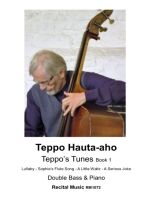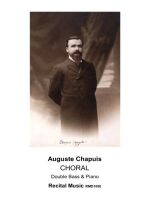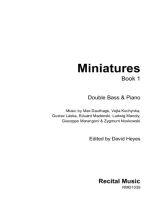Bass Octets Book 1

Product code:
£12.50
Description
Bass Octets Book 1
for double bass octet
Arranged by David Heyes
- 1. Anton Bruckner – Ave Maria
- 2. G.F. Handel – Hallelujah Chorus
- 3. Thomas Tallis – Canon for 8 Voices
Anton Bruckner – Ave Maria
Ave Maria is originally for unaccompanied choir and transcribes wonderfully for double bass octet, also playable by larger forces. The beautiful and slow moving harmonies create a work of great depth and sincerity, a work to display the rich sonority of the double bass octet, and would be suitable for any concert or occasion. There are opportunities to develop useful ensemble skills and explore the lyrical and sonorous qualities of the double bass.
Anton Bruckner (1824-1896) was an Austrian composer known for his magnificent symphonies and sacred choral music. His symphonies are seen as the culmination of Austro-German Romanticism because of their rich harmonic language, strongly polyphonic character, and considerable length. Bruckner was greatly admired by subsequent composers, including his friend Gustav Mahler, and his choral music is still popular into the 21st-century, displaying a composer of great religious faith and understanding.
G.F. Handel – Hallelujah Chorus
Originally arranged for Bass-Fest ‘98, this updated version for double bass octet became a firm Bass-Fest favourite and has been performed at Bass-Fest every year.
Two quartets work together to create one of the most joyful and exuberant of Baroque choruses and this would make a great end to any massed bass concert. It has already been performed throughout Europe and America and utilises the entire range of the double bass with enough rhythmic invention and counterpoint to keep everyone counting! Not one for the purists, but popular with players and audiences alike.
The seating of the players is at the discretion of the ensemble or conductor and the Bass-Fest solution was a large semi-circle: Db1 Db2 Db3 Db4 Db8 Db7 Db6 Db5 – with the highest parts (Basses 1 & 5) placed at the outer edges of the ensemble.
George Frideric Handel (1685-1759) was one of the greatest composers of the Baroque era. He was born in Germany but lived for much of his life in London and his vast output of works, in almost every musical genre, is still at the heart of the orchestral, choral and solo repertoire to this day.
Messiah was composed in 1741 and first performed in Dublin on 13 April 1742. Set to texts by Charles Jennens, the three-part oratorio was composed in only 24 days and the Hallelujah Chorus, a musical gem amongst many musical gems, is the final item of Part 2.
Thomas Tallis – Canon for 8 Voices
The canon, believed to have been composed in the 1560s, is one of nine tunes that Tallis contributed to Matthew Parker’s Psalter. It can be performed with four or eight voices and this edition includes the canon in a number of keys and registers.
Bassists can experiment with different articulations and dynamics, to add contrast and variety, and the use of a drone is also effective.
Thomas Tallis (c.1505-1585) was one of the most important composers of sacred music of the 16th-century. In 1543 he became a member of the Chapel Royal and served under Henry VIII, Edward VI, Mary Tudor and Elizabeth I. In 1575 Queen Elizabeth I granted Tallis and William Byrd the monopoly for printing music and music paper in England and their first publication was a collection of 34 motets, 17 by each composer, possibly referring to the 17 years of Elizabeth’s reign.
Spem In Alium, a 40-part vocal motet is one of the greatest works by Thomas Tallis and Recital Music is preparing a new edition for 40 double basses.
Description
Bass Octets Book 1
for double bass octet
Arranged by David Heyes
- 1. Anton Bruckner – Ave Maria
- 2. G.F. Handel – Hallelujah Chorus
- 3. Thomas Tallis – Canon for 8 Voices
Anton Bruckner – Ave Maria
Ave Maria is originally for unaccompanied choir and transcribes wonderfully for double bass octet, also playable by larger forces. The beautiful and slow moving harmonies create a work of great depth and sincerity, a work to display the rich sonority of the double bass octet, and would be suitable for any concert or occasion. There are opportunities to develop useful ensemble skills and explore the lyrical and sonorous qualities of the double bass.
Anton Bruckner (1824-1896) was an Austrian composer known for his magnificent symphonies and sacred choral music. His symphonies are seen as the culmination of Austro-German Romanticism because of their rich harmonic language, strongly polyphonic character, and considerable length. Bruckner was greatly admired by subsequent composers, including his friend Gustav Mahler, and his choral music is still popular into the 21st-century, displaying a composer of great religious faith and understanding.
G.F. Handel – Hallelujah Chorus
Originally arranged for Bass-Fest ‘98, this updated version for double bass octet became a firm Bass-Fest favourite and has been performed at Bass-Fest every year.
Two quartets work together to create one of the most joyful and exuberant of Baroque choruses and this would make a great end to any massed bass concert. It has already been performed throughout Europe and America and utilises the entire range of the double bass with enough rhythmic invention and counterpoint to keep everyone counting! Not one for the purists, but popular with players and audiences alike.
The seating of the players is at the discretion of the ensemble or conductor and the Bass-Fest solution was a large semi-circle: Db1 Db2 Db3 Db4 Db8 Db7 Db6 Db5 – with the highest parts (Basses 1 & 5) placed at the outer edges of the ensemble.
George Frideric Handel (1685-1759) was one of the greatest composers of the Baroque era. He was born in Germany but lived for much of his life in London and his vast output of works, in almost every musical genre, is still at the heart of the orchestral, choral and solo repertoire to this day.
Messiah was composed in 1741 and first performed in Dublin on 13 April 1742. Set to texts by Charles Jennens, the three-part oratorio was composed in only 24 days and the Hallelujah Chorus, a musical gem amongst many musical gems, is the final item of Part 2.
Thomas Tallis – Canon for 8 Voices
The canon, believed to have been composed in the 1560s, is one of nine tunes that Tallis contributed to Matthew Parker’s Psalter. It can be performed with four or eight voices and this edition includes the canon in a number of keys and registers.
Bassists can experiment with different articulations and dynamics, to add contrast and variety, and the use of a drone is also effective.
Thomas Tallis (c.1505-1585) was one of the most important composers of sacred music of the 16th-century. In 1543 he became a member of the Chapel Royal and served under Henry VIII, Edward VI, Mary Tudor and Elizabeth I. In 1575 Queen Elizabeth I granted Tallis and William Byrd the monopoly for printing music and music paper in England and their first publication was a collection of 34 motets, 17 by each composer, possibly referring to the 17 years of Elizabeth’s reign.
Spem In Alium, a 40-part vocal motet is one of the greatest works by Thomas Tallis and Recital Music is preparing a new edition for 40 double basses.



